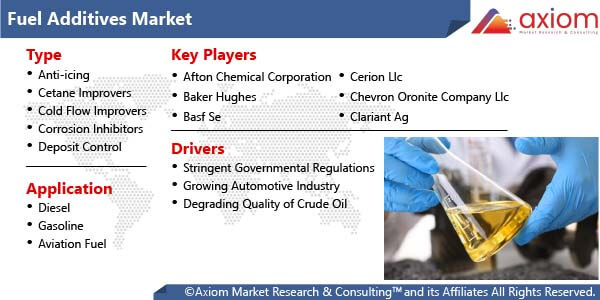Fuel additives are mixtures formulated to improve the quality and efficacy of fuels used in motor vehicles. They increase a fuel's octane rating or act as corrosion inhibitors or lubricants, therefore allowing the use of higher density ratios for greater efficiency and power. Fuel additives can help to avoid difficulties such as rough idling, weak acceleration, stumbling and stalling.
Fuel Additives Market Outlook
Enhancing the efficiency of fuel engines offers several benefits such as reduced costs, better running of vehicles and other machines, and increased life of the engine. Thus, the demand for fuel additives that can improve the quality of the fuel is likely to escalate to extraordinary levels in the coming years. Fuel efficiency is one of the most foremost concerns of the automotive sector which is progressively becoming the largest propeller of market demand. The credits along fuel lines frequently choke the injector nozzle and decrease the efficiency of the engine. To curb this, the government has executed strict guidelines on the automotive industry to avert the formation of deposits along fuel lines. Hence, the market for fuel additives is expected to reap tremendous demand over the coming years.
Fuel Additives Market Segmental Overview
The report analyses the fuel additives market on the basis of type, application and geography.
Fuel Additives Market by Type
The various types of fuel additives include Deposit Control, Cetane Improvers, Lubricity Improvers, Cold Flow Improvers, Stability Improvers, Octane Improvers, Corrosion Improvers, Corrosion Inhibitors, Anti-Icing Additives, Dyes & Markers etc. Deposit Control Additives (DCAs) consist of a polar head, then polarity of which is derived from oxygen or nitrogen molecules and a hydrocarbon tail which enables the additive to be fully fuel soluble. They are often referred to by the generic term detergents, but their function is different to that of conventional detergents used for washing and cleaning purposes. Similarly, lubricity improvers provide protection for the diesel engine components at a lower cost and with lower dosages than other types of lubricity additives. Additionally, stringent fuel regulations requiring lower sulfur content in fuels make lubricity improvers a critical additive to meet diesel specifications for lubricity.
Fuel Additives Market by Application
This market finds application in diesel, gasoline and others. The diesel fuel additives segment is expected to dominate the market and is anticipated to account for the highest fuel additives market share owing to the rising use of fuel additives in diesel fuel to comply with the severe environmental standards applied by various countries including France, Germany, the UK, the US, and Canada.
Fuel Additives Market by Geography
Geographically, the global Fuel Additives market is studied for the key countries of North America, Europe, Asia Pacific and Rest of the World. Rest of the World comprises of Latin America and Middle East & Africa. North America is likely to be the largest fuel additives market during the forecast period. Globally, the region has been driving the market, in terms of demand as well as product innovation regarding quality and application development. Due to stringent environmental regulations, the fuel additives market is witnessing significant growth. The North American market is highly controlled with the Environment Protection Agency (EPA) playing an important role in the nursing and commercialization of fuel additives products.
Fuel Additives Market Key Players
Key players of the global Fuel Additives market are Innospec Inc., Chevron Oronite Company, The Lubrizol Corporation, Afton Chemical Corporation, Evonik Industries AG, BASF SE, Lanxess, Dorf Ketal Chemicals, Infineum International Limited and Cummins Inc. among others.











